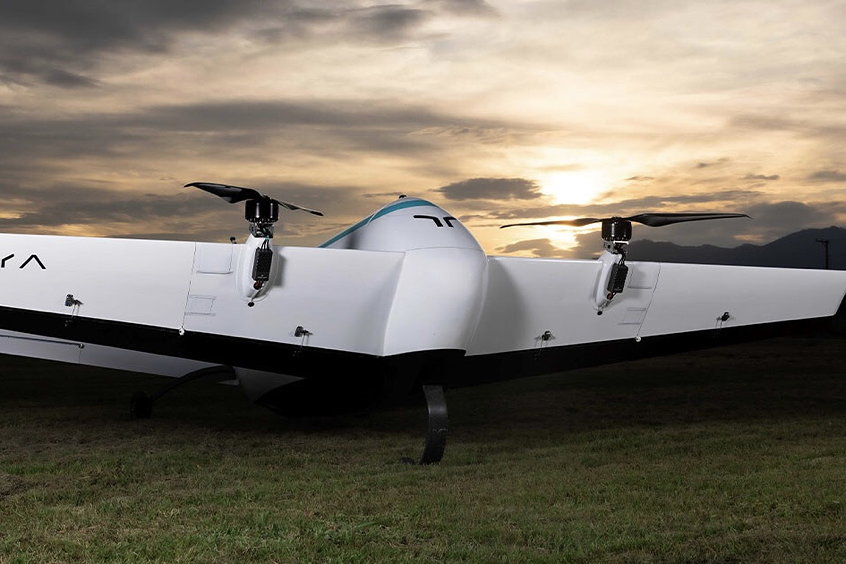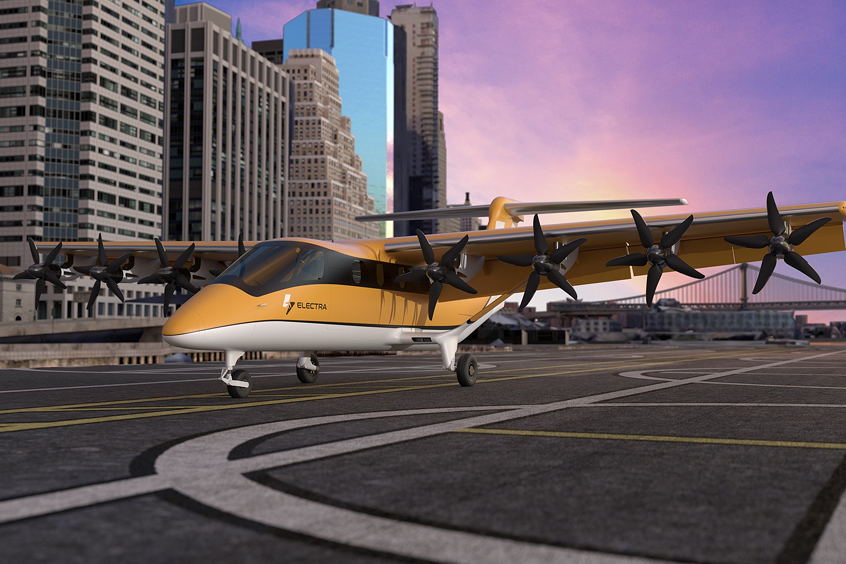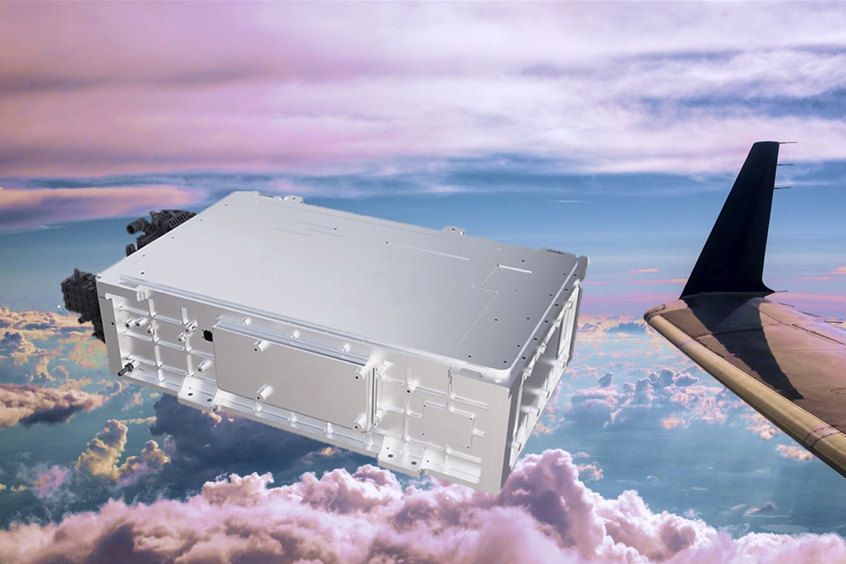Four years of preparation, various patent applications, several strategic partnerships and the founding of e.SAT GmbH, a manufacturer of electro-hybrid air planes, have led to an invention that will ensure tomorrow's environmentally-friendly mobility. e.SAT GmbH, RWTH Aachen University, RWTH Aachen Campus and FH Aachen introduced their Silent Air Taxi, a futuristic model of a small plane, at an even with more than 100 invited guests from academia, industry and politics. The unique electro-hybrid drive system and the optimized airflow mechanics of the boxwing concept will allow this air taxi to offer affordable strain relief on traditional passenger transport carriers, and reduce individual travel times significantly.
The former airport Aachen-Merzbrück will be transformed into a research airfield with the financial support of North Rhine-Westphalia's state government, where the Silent Air Taxi will be developed to manufacturing maturity and production. The strong partner network on RWTH Aachen Campus will drive its technical development until its official commissioning in 2024 and is preparing for its maiden flight in 2022. Armin Laschet, Minister President of North Rhine-Westphalia, elaborated on the importance of this development for his state at the opening of the event. His personal impression regarding this pioneering project: “Environmentally friendly and affordable air taxis can make an important contribution to mobility in our conurbations. The Silent Air Taxi, a quiet and low-emission hybrid small aircraft, is the next innovation of alternative and climate-friendly mobility solutions 'made in North Rhine-Westphalia'. It is always impressive to see how stakeholders from academia and industry work closely together to develop concrete, everyday technologies for sustainable mobility from futuristic visions. This is how scientific excellence is translated into industrial production.”
The Silent Air Taxi
The small aircraft flies with four passengers and a pilot, has a range of up to 1000 km, and a cruising speed of over 300 km/h. For takeoff and landing, the craft will need an airstrip of max. 400 m length, which will allow it to fly to 95 percent of all German airports and airfields. 80 percent of the German population lives within a 25 km radius of an airfield. At takeoff, the Silent Air Taxi is so quiet that its sound becomes indiscernible at a distance of just 100 meters. The maiden fight is scheduled for 2022 and a type certification is pursued for 2024. The objective is to ensure that Silent Air Taxi operations will be as affordable as first class rail tickets.
“Our understanding of innovative air mobility is consistently aligned with the needs of customers. These are shorter travel times, punctuality and flexibility with regards to individual requirements”, explain the two e.SAT GmbH CEOs Prof. Peter Jeschke and Prof. Frank Janser. Other key founding figures are Prof. Günther Schuh (CFO), Prof. Eike Stumpf (Head of Development) and Prof. Kai-Uwe Schröder (Structural Mechanics), who are set to manufacture the Silent Air Taxi in series production in partnership with e.SAT GmbH in Aachen-Merzbrück.
Research Airfield Aachen-Merzbrück
The development of the Silent Air Taxi will continue at Aachen-Merzbrück until manufacturing maturity. Various research requests in connection with the project have been submitted. Merzbrück will be developed into a research airfield for more than 12.7 million euros. The takeoff and landing strips will be newly constructed and pivoted (sponsor: Aachen Merzbrück Airfield), while the Aeropark industrial area will be developed and will have direct access to the takeoff and landing strips (sponsor: Stadtentwicklung Würselen (Urban Development Office)). The new research hangar FH.AERO.SCIENCE will be constructed in the industrial area (sponsor: FH Aachen). The Ministry of Transport of the State of North Rhine-Westphalia is funding the transformation into a research airfield with four million euros. Hendrik Wüst, Transport Minister of North Rhine-Westphalia, is proud of the fact that NRW can once again prove itself as an innovative region and a driving force behind the mobility revolution.
“Projects like the Silent Air Taxi and the development of Aachen-Merzbrück into a research airfield show that North Rhine-Westphalia has all the prerequisites of being at the forefront in the creation of groundbreaking technical innovation. We support the development here in Merzbrück, as it will drive the research on electro-powered aircrafts and the options for low-noise air travel forward. In a highly populated and congested federal state like North Rhine-Westphalia, it is a step in the right direction to think of the air as a third dimension for mobility. We want to make sure that the research and development of mobility for the future will happen right here in North Rhine-Westphalia and – best case scenario – will also be manufactured and implemented here. The project allows us to contribute to the development of the Rhine Region, and to give the people living here entirely new perspectives”, explained Transport Minister Wüst.
Innovation Hub Aachen
The Silent Air Taxi is another example of the efficiency of the Innovation Factory on RWTH Aachen Campus. “The ability to develop systemic innovations that benefit society is a strategic goal of RWTH Aachen, which we pursue in collaboration with technology partners on RWTH Aachen Campus. The Silent Air Taxi is another milestone for us, now that the delivery of the first e.GO Life electric cars commenced a few weeks ago. It shows that Aachen is a prime location for interdisciplinary research and development, and that we utilize the option of interlinking academia and industry to its full potential”, explains Ulrich Rüdiger, Rector of RWTH Aachen University and Chairman of the Supervisory Board at RWTH Aachen Campus GmbH.
The Industry Partners
More than 50 experts are currently developing and building the low-noise Silent Air Taxi in collaboration with renowned industry players of the German aviation sector – such as MTU Aero Engines AG. For MTU Aero Engines, the Silent Air Taxi is a courageous and convincing future concept with very high chances of realization. This is why we not only participate as a technology partner but also in e.SAT Powertrain GmbH,“ says Lars Wagner, Chief Technology Officer, MTU Aero Engines. e.SAT Powertrain GmbH, a subsidiary of e.SAT GmbH, is a manufacturer of electro-hybrid drives.
| Contact details from our directory: | |
| e.SAT GmbH | Airframer |
| RWTH Aachen University | Research/Consulting Services, Technical/Eng/Scientific Studies |
| MTU Aero Engines | Compressors, Engine Parts, Additive Manufacturing, Final Assembly, Turbine Engine Starters, Combustion Test Services, Turbine Engine Blades, Turbine Engine Vanes, Blisks, Fuel Cells |
| Related aircraft programs: |
| e.SAT Silent Air Taxi |
Weekly news by email:
See the latest Bulletin, and sign up free‑of‑charge for future editions.

Altair collaborates with aerospace startup Moya Aero to develop eVTOLs

Electra reveals design for EL9 hybrid-electric aircraft
Piper Aircraft achieves AS9100 certification
